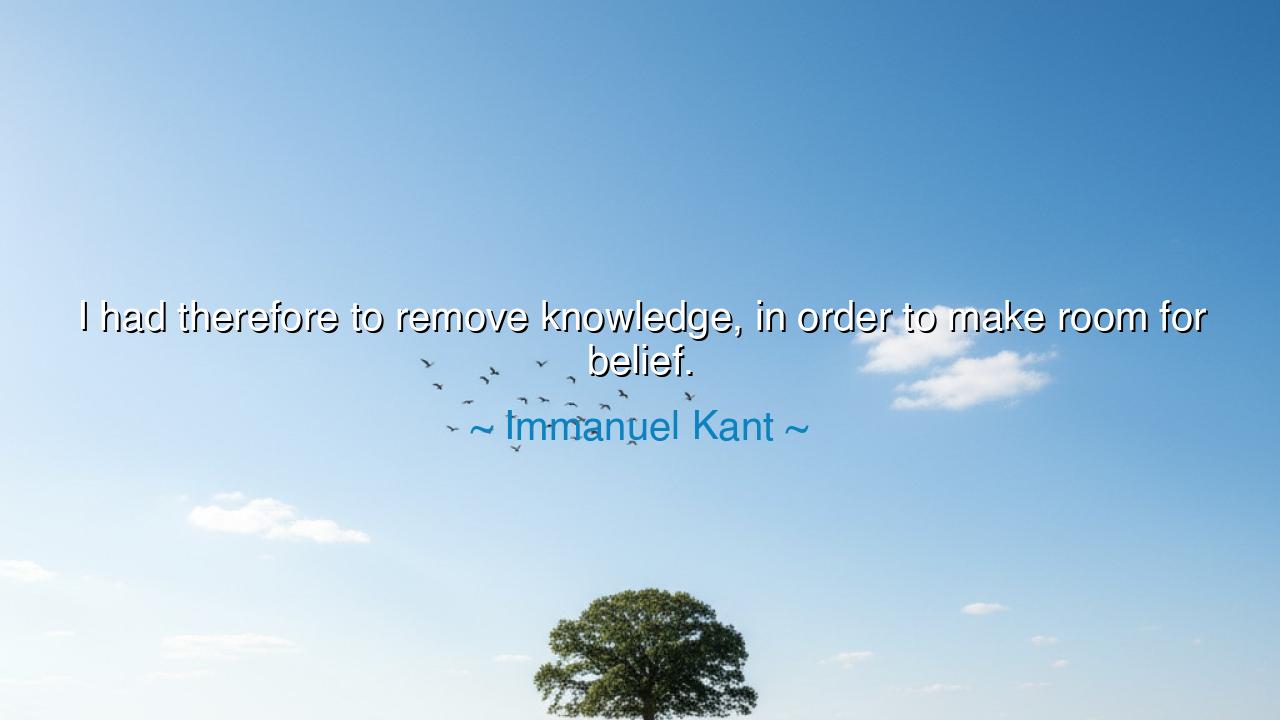
I had therefore to remove knowledge, in order to make room for






“I had therefore to remove knowledge, in order to make room for belief.” — Immanuel Kant
Listen, O seeker of wisdom, to the profound words of Immanuel Kant, the philosopher who gazed into the depths of reason and the boundaries of the human mind. In this declaration, he reveals not a rejection of knowledge, but the discovery of its limits. For in his great labor, Kant found that reason — though mighty and radiant — could not grasp the infinite. The human intellect, glorious as it is, stands before the mysteries of existence like a candle before the sun. Thus, he said: “I had to remove knowledge, in order to make room for belief.” He sought to remind the world that beyond what can be known lies what must be trusted — the unseen, the moral, the divine.
The origin of this saying lies in Kant’s masterpiece, Critique of Pure Reason, where he wrestled with the question that had haunted philosophers for centuries: What can we truly know? In the age of enlightenment, men placed supreme faith in reason. They believed the intellect could unveil every secret, from the movement of the stars to the will of God. But Kant, with piercing insight, saw the flaw in this faith. He showed that the mind is bound by its own design — it can interpret only what experience allows. There are truths too vast, too transcendent, that reason cannot reach. Thus, he cleared the field of overconfident knowledge, not to destroy truth, but to make way for faith — for those truths that must be grasped not by logic, but by the soul.
To “remove knowledge” was not to scorn learning, but to humble it. It was to recognize that the intellect, magnificent though it may be, cannot replace the inner conviction that guides the heart. For what reason cannot prove, belief must sustain. The stars above us may be explained by science, yet the wonder they awaken — that silent reverence that whispers of purpose — belongs to belief. The laws of physics may describe how life moves, but they cannot tell us why we should cherish it. Thus, Kant’s wisdom teaches that knowledge is the lamp that lights the path, but belief is the strength that walks it.
Consider the tale of Socrates, the sage of Athens, who was condemned to death for questioning the false certainties of his age. When his disciples wept, he spoke calmly of the soul’s immortality — a truth he could not prove, but which he believed with serene conviction. He had examined the reach of reason and found that it ended where mystery began. In that moment, his belief carried him beyond fear, beyond the limits of logic, into peace. So it is with all who walk the narrow bridge between knowledge and faith — they must learn when to reason, and when to trust.
Kant’s insight stands as a beacon against both arrogance and despair. For there are those who worship knowledge and believe only what they can measure — their world becomes small, their hearts cold. And there are those who despise reason altogether — their belief becomes blind, their faith wild and untethered. But the wise, following Kant, hold both in balance. They use knowledge to explore the visible world, and belief to honor the invisible. They understand that the two are not enemies, but companions — like the two wings of a bird, lifting the soul toward truth.
The lesson is clear: do not let the hunger for knowledge silence the whisper of faith, nor let faith dismiss the discipline of thought. When you study, do so humbly, remembering that every discovery opens a thousand more mysteries. When you believe, do so thoughtfully, knowing that belief without reason is superstition, and reason without belief is emptiness. Let your mind be sharp, but let your heart remain open. For knowledge alone fills the mind, but belief nourishes the soul.
Therefore, my child, learn deeply — study the stars, the atoms, the histories of men — but never forget to leave space for wonder. For when the mind reaches its limit, the spirit begins its flight. Kant did not destroy knowledge; he freed it from pride. He taught us that faith and understanding are not rivals but allies, that the finite must bow before the infinite. Walk, then, with both reason and reverence — for only when the light of the mind and the warmth of the heart shine together will you behold truth in its fullness.
Thus remember: to remove knowledge is not to discard it, but to make room for belief. For wisdom lies not in knowing all things, but in knowing that not all things can be known — and in believing, with courage and grace, what reason alone cannot grasp.






AAdministratorAdministrator
Welcome, honored guests. Please leave a comment, we will respond soon